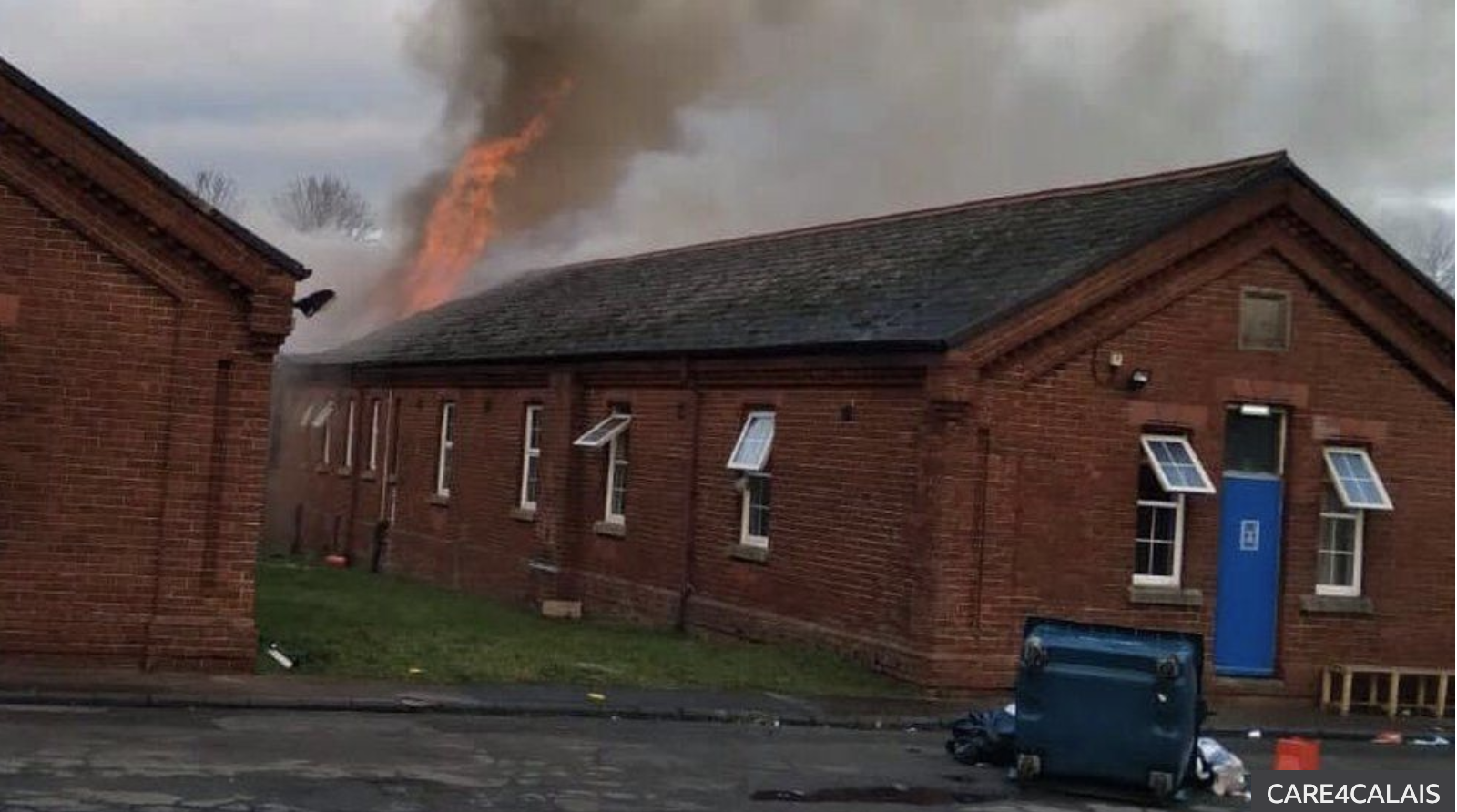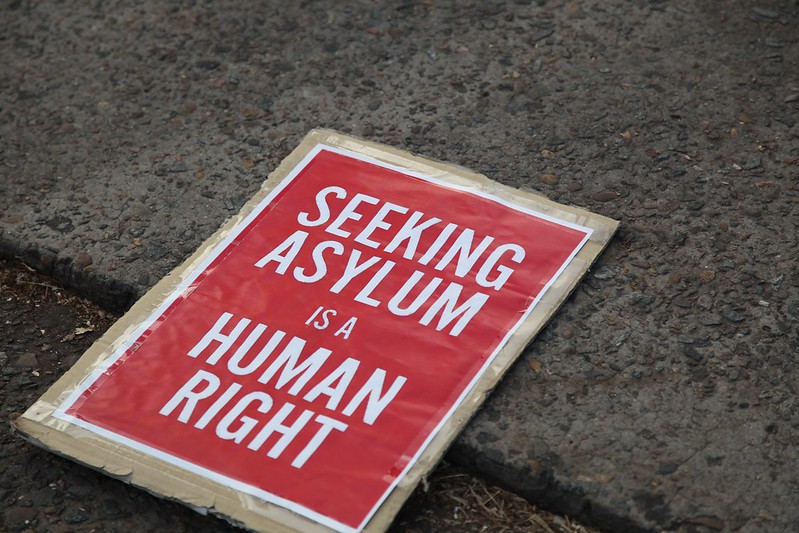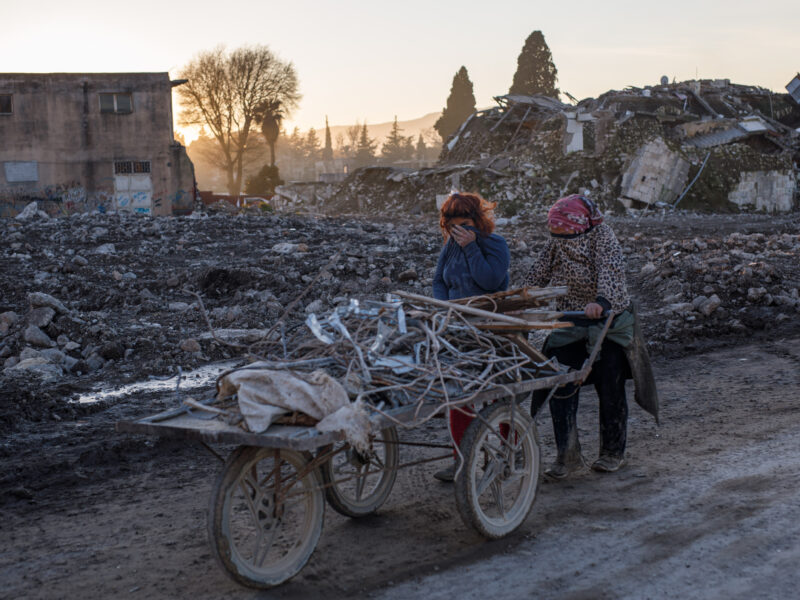The U.K. government’s policy of housing asylum seekers in army barracks has caused a storm of controversy.
Every day and every night during his stay, Kareem* had to listen to the sound of far right extremists. They swore in English and Welsh, threatened the men living inside, and by night hurled rocks at the metal gates of the camp.
“You’re not welcome here,” they told the asylum seekers.
This is the Penally Camp in Wales; formerly an army camp, it is now used to house newly-arrived asylum seekers. Kareem was taken there at the end of September. The experience, he said during a phone interview, gave him flashbacks—memories of torture and imprisonment that he had escaped and from which he sought refuge. “We are vulnerable people,” he said, adding: “We need someone to support us here in the U.K.”
With another national lockdown due to the pandemic, attacks from the far right eased. But anti-immigrant demonstrations outside the camp are not the only problem the men inside faced. Kareem said that when he arrived at Penally there were no interpreters; detainees resorted to communicating with camp management through gestures. He said security and management were racist and treated the men poorly. Access to medical care was patchy.
When asked if there were any social distancing measures, he laughed and said: “In the middle of a pandemic you’re in a room with five other people.” The only place people wore masks was in the queue for food.
Kareem spent nearly two months in the camp before an NGO managed to secure his release, but plenty of others remain inside. The number of residents was recently reduced to around 100.
In England, behind the wire fences and red brick exterior of the ex-army camp, Napier Barracks has been the cause of controversy and protest since September 2020, when the U.K. Home Office started using it to accommodate around 400 men. A High Court judge ruled that conditions in the camp were prison-like, unsuitable, and unsafe. Many of the asylum seekers housed there are survivors of torture, trafficking, and other traumas; and yet, there is little access to mental health support. There have been several reports of suicide attempts.
Public Health England warned the Home Office that Napier was unsuitable back in September 2020. In April 2021, a judicial review will examine claims from five asylum seekers that the accommodation is inadequate.
From inside Napier, photos shared with the NGO Choose Love show the true story. Garbage cans overflow into the corridor, with old food containers and plastic cups spilling out of black bags. In a hall, metal frame beds topped with plastic mats are lined against the walls, set up as a dorm room. The beds are around two metres from each other, but the men breathe the same air, in the middle of a global health pandemic.
It didn’t take long for COVID-19 to race through the facility. On Wednesday the Home Office revealed that at least 197 people had tested positive, a shocking number that amounted to 50 percent of the total people held there and nearly double what the government had previously reported.
Earlier this year a fire broke out in one of the blocks, thought to have been started deliberately. Nobody was hurt, but people say they were left without electricity, heating, and drinking water.

From within the camp, an anonymous man posted a message following the fire, in which he offered some compassionate insight as to the would-be arsonist’s motives. He wrote, “Each of us react in our own unique way when we are desperate and disappointed. Some may protest peacefully[…] some may lose control. I want you all [to] know that this was not something that we all can approve.”
Home Secretary Priti Patel was less compassionate toward the desperate person who set the fire. She tweeted: “The damage and destruction at Napier Barracks is not only appalling but deeply offensive to the taxpayers of this country […] This site has previously accommodated our brave soldiers and army personnel—it is an insult to say that it is not good enough for these individuals.”
In response to the assertion that accommodation built for soldiers was “good enough” for asylum seekers, Kareem said: “We had wars, we had bombs… all of the bad things that happened in our home countries. We came here to seek refuge and to settle in peace.”
Fighting to empty the barracks
Freedom From Torture is one of two NGOs that have launched petitions calling for the barracks to be closed. As of this writing, more than 39,000 people have signed.
During the summer of 2020 there was saturation coverage of asylum seekers crossing the English Channel from France. Priti Patel said she wanted to make the route ‘unviable.’ At the Port of Dover, anti-immigration protesters, many of them football hooligans and Nazis, clashed with police—even as anti-racism grassroots groups showed up to express solidarity with the asylum seekers. And yet, compared to other European countries the U.K. saw relatively few people entering the country as refugees.
Aalia Khan, Freedom From Torture’s media manager, told The Conversationalist: “A lot of asylum seekers have fled persecution and torture, and have made very dangerous journeys across the world, only to end up in the U.K. in the equivalent of a refugee camp created by the Home Office.”
She said that the use of army barracks is part of a worrying trend of asylum seekers being used as political tools.
Khan said, “We’re absolutely appalled by the use of barracks to house very vulnerable people.: She added that the barracks were “not fit for human habitation,” whether the inhabitants were soldiers or asylum seekers.
When asked for a response to the situation at Napier, a Home Office spokesperson told The Conversationalist: “They [asylum seekers] are provided with safe, warm, secure accommodation with three nutritious meals served a day—all paid for by the British taxpayer. These sites have previously accommodated army personnel and it is wrong to say they are not adequate for asylum seekers.”
MP Holly Lynch, the Shadow Immigration Minister, raised concerns about the barracks in a letter in December 2020, saying she was deeply concerned about unsafe living conditions. After the Government conducted an independent review, she asked for the outcome. But they did not publish the report, nor share their findings with her.
“What on earth do the Government have to hide?” she asked. “It’s clear that their lack of compassion and competence has resulted in an unacceptable situation in Napier Barracks, creating the perfect situation for COVID to be transmitted, putting at risk the people living in the former barracks, the staff and the neighbouring community. The U.K. Government must come clean and publish the report without delay.”
Is this the future of the UK asylum system?
Until recently, the government planned to set up another camp for asylum seekers in the Hampshire Village of Barton Stacey, but those plans are now under review. Aalia Khan said she believed that the work of organizations like Freedom From Torture in exposing the terrible conditions in the camps has been effective in persuading the government not to expand further its policy of detaining asylum seekers in army barracks.
According to Home Office documents, the barracks were designed as a temporary measure. While only men are housed there, women and children are put in hotels, or in mother and baby units.
“I don’t think that there’s any need to house asylum seekers in barracks or in any building that’s unfit for human habitation,” said Kahn, adding that with the pandemic lockdowns there were plenty of empty hotels that could have been used instead.
In September The Financial Times leaked Home Office plans to implement an Australian-style offshore detention system, whereby asylum seekers would be taken thousands of miles from the U.K. and held on an island in the Atlantic Ocean. The Labour Party called the plan inhumane. The Home Office said they were looking at every option.
Kolbassia Haoussou is the lead survivor advocate for Freedom from Torture. He has personal experience of the U.K. asylum system, and is a torture survivor.
“One of the key elements of rehabilitation for me was feeling safe,” Haoussou says. Being held in military barracks would surely trigger trauma and do nothing to help the healing process.
He echoed Khan’s observation about the asylum system having become politicized. For Haoussou, the basis of the asylum system should be about protection.
“What we should do is find out how we can protect people, not how we can reject people,” he said.
Following the U.K’.s exit from the European Union (Brexit), the future of the asylum system is unclear, and so too is the role that former military barracks will play. Accommodation is just one piece of the asylum system puzzle, but when it has the capacity to affect a person’s sense of safety so powerfully, the U.K. must make an effort to get it right.
*Kareem is not his real name, as he wanted to remain anonymous



